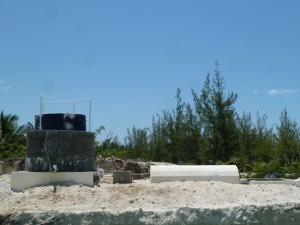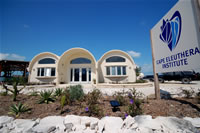In recent weeks, the CEI/IS biodigestion system has quietly been generating an unheralded form of renewable energy: biogas. Although biodigestion is the most recent addition to the renewable energy scheme on campus, the process of generating renewable energy through anaerobic digestion is arguably the cleanest form of energy production we have. By closing the loop between food production, energy production, and waste management, biodigestion represents a serious step forward in our efforts to become more self sustaining and generate models that can be replicated on a local level.  What is biodigestion, though? In layman’s terms, biodigestion is simply the breakdown of organic material in an anaerobic setting. As naturally occurring bacteria consume organic wastes, they generate gas, mostly methane, which can be used as a fuel source. During the break down process,any potential pathogens or harmful bacteria are out-competed, leaving nutrient rich fertilizer as an end result. In short, biodigestion uses safe waste management techniques to generate renewable energy and nutrient dense fertilizer, which is capable of increasing plant yields significantly. Continue reading
What is biodigestion, though? In layman’s terms, biodigestion is simply the breakdown of organic material in an anaerobic setting. As naturally occurring bacteria consume organic wastes, they generate gas, mostly methane, which can be used as a fuel source. During the break down process,any potential pathogens or harmful bacteria are out-competed, leaving nutrient rich fertilizer as an end result. In short, biodigestion uses safe waste management techniques to generate renewable energy and nutrient dense fertilizer, which is capable of increasing plant yields significantly. Continue reading
All posts by ceiblogger
New blog for the Cape Eleuthera Institute
Hi all and welcome to the new Cape Eleuthera Institute (CEI) blog! We are excited to have a new space to highlight the innovative and exciting research being done at CEI. There will also be information on sustainable systems projects on campus, and updates on the many different educational programs that utilize CEI researchers to provide a science-based curriculum.
Check back weekly for new posts on the current happenings at CEI. Past blog posts involving CEI research can be found at www.islandschool.wordpress.com
Culturing Penshells at the Cape Eleuthera Institute
Two weeks ago the Cape Eleuthera Institute (CEI) harvested over one hundred black penshells from a beautiful beach at Ten Bay, located near Palmetto Point. Penshells are a kind of scallop, and we aim to culture them here at CEI for a of couple reasons. As filter feeders, penshells thrive in water with higher nutrients, using the nutrients to grow and as a result clean the surrounding water. Currently, we have our collected penshells in two separate groups: one group in the wet lab in a flow through tank, and another group in a small cage about 100m off the beach where our main pump intake is. In the lab, we feed the penshells concentrated microalgae, whereas the group out in the ocean does not get fed. We are monitoring both groups daily, by recording temperature, dissolved oxygen and salinity.
Once both groups are acclimated and showing good growth rates, we are going to attempt to breed them and raise penshells into maturity. We plan on putting the resulting stock in the mangrove
GAP Program Update #3
By Calvin Clapp
Here in South Eleuthera, the past couple weeks have been somewhat of a blur. Whether the blame falls upon camping trips, scuba diving or research, there is no doubt that we have been fully engaged in life on the island. Last weekend, the interns organized a small camping trip to Surfer’s Beach. So we started bussin’ it down the island, making any of the necessary stops to make it a proper camping experience. After sharing stories and laughs, with the fire simmering down, we all headed to bed ready for a fun-filled day of aquatic activities. The last minute decision to camp was not regretted by anyone.
With drowsy eyes and with a trailing stench of campfire, we rolled back to campus ready to take on a couple days of learning in the field with our respective research groups. We soon realized that our recent camping trip was only a pre-game for our exclusive DIT (Down Island Trip) for the gaps and our leader, Scotty.
[slideshow]
This served as a great opportunity to explore and experience Continue reading
CEI’s Kristal Ambrose as Guest Speaker at Bahamas National Trust
Last week the Bahamas National Trust hosted Kristal Ambrose, Aquaponics Technician at Cape Eleuthera Institute, as a public meeting guest speaker. The topic for the evening featured her internship to study plastics in the North Pacific Western Garbage Patch, an area highly concentrated with plastic debris and an environmental issue only just beginning to be studied by scientists. Kristal recounted her expedition, which sought to answer questions that explore what happens to plastics that enter the ocean, from ingestion by marine life, to absorption of harmful pollutants. The opportunity to share this experience with a Bahamian audience was especially important to Kristal, as her primary goal following this study is to find real solutions through education, research and outreach projects in her home country. After peaking the interest of one attendee at the BNT meeting, Kristal was approached to also share her experience with students at St. Andrews School where she spoke to two classes on Friday.
Kristal’s study was supported by the BNT, Bahamas Reef Environment Foundation (BREEF) and The Nature Conservancy, all of whom were represented at the meeting Continue reading
Island School Students’ First Week of Research Class
Research classes kicked off this week for The Island School students. On Tuesday, students broke into their 8 different research groups and spent the afternoon getting to know their research advisors–members of the research team at the Cape Eleuthera Institute (CEI). They also learned about the study they would be working on for the next 3 months. Thursday afternoon was their first field block, where they got out on the water or into the lab for the first time! The 8 studies being conducted this semester focus on shark ecology & physiology, the impact of climate change on bonefish & mangrove flats species, lionfish & reef fish population ecology, and sea turtle & conch abundance & distribution around South Eleuthera. These studies are well-established areas of research at CEI and as a result, many visitors and collaborators will be visiting our campus over the next few weeks to share their knowledge and expertise with the students.
Research class is an exciting opportunity for students to gain new skills in the field – from fish identification and handling to public speaking and PowerPoint creation. Students learn about and contribute to global conservation issues, work in small groups, and ultimately, have the experience of a lifetime!
The Story of Sharks
Last spring, CEI interns, Brendan Talwar and Ian Rossiter, created a short film about the endangerment of sharks to share with the public at the Governor’s Harbour Agricultural Expo. They used a unique method of film making called stop motion, which requires taking thousands and photos and stringing them together to create motion. The result of their efforts was incredibly impressive–so much so that it caught the attention of famous French underwater videographer (and former member of Jacque Cousteau’s prestigious dive team), Didier Noirot during his visit to the Cape Eleuthera Institute in April. Didier helped Brendan and Ian perfect the film and encouraged them to submit the film to a festival. This summer, their short film was chosen as a finalist in the 2012 BLUE Ocean Film Festival in the Animated category. Brendan and Ian will be attending the festival along with Edd Brooks, CEI’s shark project manager, September 24-30 in Monterey, CA. Below is the trailer for their film, “The Story of Sharks”. Good luck to Brendan and Ian!
OSU’s Dr. Mark Hixon at CEI
Dr. Mark Hixon plus four graduate students have been conducting lionfish research at CEI this summer. Dr. Hixon is the most cited coral reef biologist in the last decade and recently gave a TED talk about the lionfish invasion.
Mark and his team our the first long-term residents in Hallig House. He speaks about his experience at CEI in the video below. Mark will return later in August with Carl Safina and a film crew in tow. They will be shooting an episode for Saving the Ocean.
Growing Power!
Last week The Island School orchard received its first dose of steroids from the biodigester. The Island School biodigester uses naturally occurring bacteria to generate renewable energy and sterilize our septic waste. The outcome? Highly nutrient rich, liquid fertilizer that has the potential to increase crop yields substantially. In some cases, certain crops have increased their yields by up to sixty percent with the addition of biodigestion effluent. A resource such as this could work wonders for both CEI and Island School as we are always seeking more local food sources and readily available, healthy snacks. With a bit of sunshine to go with these nutrients, we could eventually put the marina store out of business. Coming into season right now are sour oranges, guava, mango, sugar apples, cherries, coconuts, sapodillas, and passion fruit. Pick your poison. The next questions to ask are how much food can we make and how fast? What does it take to ween ourselves of imported fruits and vegetables? A large part of the answer is our biodigestion system that is already producing for us on a daily basis.
[slideshow]
Water Quality Testing and the Biodigestion Process
Water is the most important resource available to CEI and Island School. We drink it, we bathe in it, we cook with it, and it all comes from the rain. Although we can never know what the weather may bring us, we can always be ready to take advantage of what does come our way as weather patterns shift. To that end, we use solar panels, and wind turbines, but most importantly, we catch rain water. Of late, one of the most important issues we’ve been tackling is how to make our water last and how to maximize it’s potential. If we catch water once, how many times can we use it before it’s gone? Last week we took a significant step towards increasing the usefulness of our water.
This spring CEI and Island School put biodigestion on the map for The Bahamas. We’ve found a way to treat our waste and generate more renewable energy, in addition to getting added utility from our water. The process of biodigestion Continue reading
